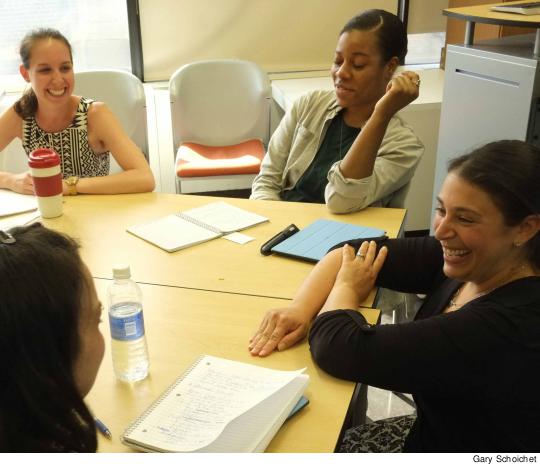 |
Sherry Cleary, director of CUNY’s Early Childhood Professional Development Institute, says the institute has been working with CUNY faculty for the last several months on a recruitment, teaching and support program offering intensive pre-K teacher education.
“You’re taking on a lot when you agree to be a pre-K teacher. Four-year-olds are still very young, their families are very young,” Cleary told Clarion. “You’re a teacher, you’re a social worker, you’re kind of a medical professional.”
This September, about 1,000 new teachers are needed to meet the City’s initial goal of offering full-day pre-K to 53,000 of the city’s four-year-olds. More than a third of them will be educated through the new programs at CUNY. A total of 2,000 new pre-K teachers will be needed by September 2015.
Accelerated Program
Cleary has been on the mayor’s pre-K working group since December. With $300 million in State funding secured this spring, they moved fast to create two new tracks for pre-K teacher education. One track offers a fully subsidized 14-month master’s program at the five CUNY campuses with graduate programs in early childhood education: Brooklyn College, City College, Hunter, Lehman and Queens. Classes began this summer and 120 students are currently enrolled in the new program across the five campuses.
Now that the program is up and running, Cleary says the focus is on the teacher candidates themselves. “Our attention [has now turned] to helping them manage all the stress and demands on their time and brains,” she explained.
This summer, students in the master’s program are taking at least 12 credit-hours of course work and have four to six weeks of field experience at a community-based organization. Come September, they will teach in a pre-K classroom at a community-based organization, while taking further classes two or three evenings a week. The following summer, students will finish their remaining coursework and student-teach in kindergarten through second grade classrooms.
A second track is designed for those who are already working toward certification for teaching early childhood through grade two. It aims to help students get certified more quickly, by offering additional support. Students devise a study plan, access career advisers and may take classes at one the of the five CUNY colleges. This track is also subsidized and applications are being accepted until available slots are filled.
Through a $6.7 million partnership between the City and CUNY, up to 400 professionals will be certified by September 2015, according to the mayor’s office.
This summer, 36 students are taking classes in Hunter College’s master’s program in early childhood education. Associate Professor Christina Taharally, who coordinates pre-K teacher education at Hunter, says the students in the new program take the same coursework for their master’s degree as others, but at an accelerated pace. This summer they’re taking classes on early childhood curriculum, language and learning, and they’re learning how to encourage a sense of discovery in the classroom.
“If we think of the four-year-old’s favorite question, it’s ‘Why? Why is there thunder? Why does this happen that way?’” Taharally told Clarion. The teacher candidates at Hunter “are learning about the child’s development, and they’re learning about what are good teaching methods, curriculum and practices for four-year-olds.”
Assistant Professor Lindsay Portnoy is teaching early childhood development at Hunter this summer. “I don’t think these children should be sitting with workbooks. The teachers can engage the whole child,” Portnoy told Clarion. Pre-K teachers, she said, “can make sure that [children are] engaged physically and honing their growth and motor skills. They’re jumping and running.”
In her class, she takes theoretical concepts and translates them to classroom activities. A child can learn how to count by using one-to-one correspondence, by seeing the number ‘1’ and placing one Cheerio on a plate. A group activity or help from a teacher can lead a child to a higher level of understanding.
Focus on the Whole Child
“[We’re] not just pushing didactic teaching, but looking to create a rich, experiential, play-based experience appropriate for four-year olds,” City College Professor Beverly Falk told Clarion.
Falk directs the graduate program in early childhood education at City College. She says an essential part of the pre-K education program is also providing support to the teachers once they’re outside of their graduate classes and inside the pre-K classroom. Campus liaisons check up on teachers when they’re teaching during the school year. Once the pre-K scholars graduate, the program continues to provide support for things like additional coaching or exploring bilingual training.
At Hunter College, Portnoy says, the new attention and support for early childhood education is overdue.
“I think that this is a really critical moment in education, where we’re finally acknowledging the importance of education for the youngest of our students,” Portnoy said.

